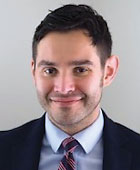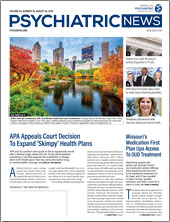Why should you plan on attending IPS: The Mental Health Services Conference this October 3 to 6 in New York City? The short answer is the community! For years, I have closely identified with the delightful group of people that attend the IPS meeting. I’ve found this meeting to be a wonderful place to learn, relax, reflect, and connect with colleagues.
If you’ve never been to IPS, this meeting is a smaller, more intimate meeting than the APA Annual Meeting. Networking is not one of my strengths, but I have found the people who attend IPS to be so welcoming that I have met many mentors and formed many connections that last long after the meeting ends. In fact, people I’ve met at IPS have played a big role in helping me to shape the direction of my career and professional identity.
The meeting is all about community psychiatry, focusing on issues that affect people who are in the greatest need. This year, the theme of the meeting is “Improving Access Through Innovation and Collaboration.” Increasingly as a psychiatrist in a public-hospital setting, I find myself having to do more with less. The mental health system can be a challenging place to effect change, but we must continue to fight for those we work with and improve our systems of care. Often, this requires looking at things a different way and thinking creatively. I often sit back at IPS sessions and ask myself, “What would it take to pull this off in Atlanta?”
The meeting will feature four tracks: community psychiatry, collaborative and interdisciplinary care, addiction psychiatry, and diversity and health inclusion.
As someone who has worked on an Assertive Community Treatment team and someone who currently works on a Coordinated Specialty Care team for people with first-episode psychosis, I am particularly excited about the meeting’s focus on collaboration. The meeting will provide multiple sessions tailored to our colleagues in other disciplines, including social workers, physicians, psychologists, nurse practitioners, physician assistants, patients, and caregivers. I am expecting some rich discussions about how best we can move forward together.
There are several events scheduled for the meeting this year that I find particularly exciting. First, Dr. E. Fuller Torrey will speak at the Opening Session. I’m sure you won’t want to miss his talk, “What American Psychiatry Got Wrong: Why the IPS Is Needed.” His classic book Surviving Schizophrenia greatly influenced me as a psychiatry resident and is a resource that I often recommend to families with whom I work.
Other sessions of particular interest to me include Dr. Patrick Corrigan’s talk titled “The Stigma Effect: Unintended Consequences From Programs Meant to Stop the Stigma of Mental Illness”; “Disparities at the Intersection of Mental Health and Criminal Justice: A Round Table Discussion,” chaired by Dr. Altha Stewart; “Climate Psychiatry: What Every Psychiatrist Should Know,” chaired by Dr. Anne Richardson; and “Personalized Medicine in Psychiatry: Not Yet Realized, but a Bright Future,” chaired by Dr. Charles Nemeroff.
You should also consider attending the Early Psychosis Pre-Conference on October 2 (see
here). This is a collaboration between APA, the National Institute of Mental Health, the Substance Abuse and Mental Health Services Administration, SMI Adviser, and PEPPNET (Psychosis-Risk and Early Psychosis Program Network). Headlining this meeting are two renowned experts in first-episode psychosis, Drs. Lisa Dixon and Dost Öngür.
I’m really looking forward to IPS this year and hope to see you there! ■
More information on IPS and the Early Psychosis Pre-Conference, including registration and housing information, can be accessed
here.

